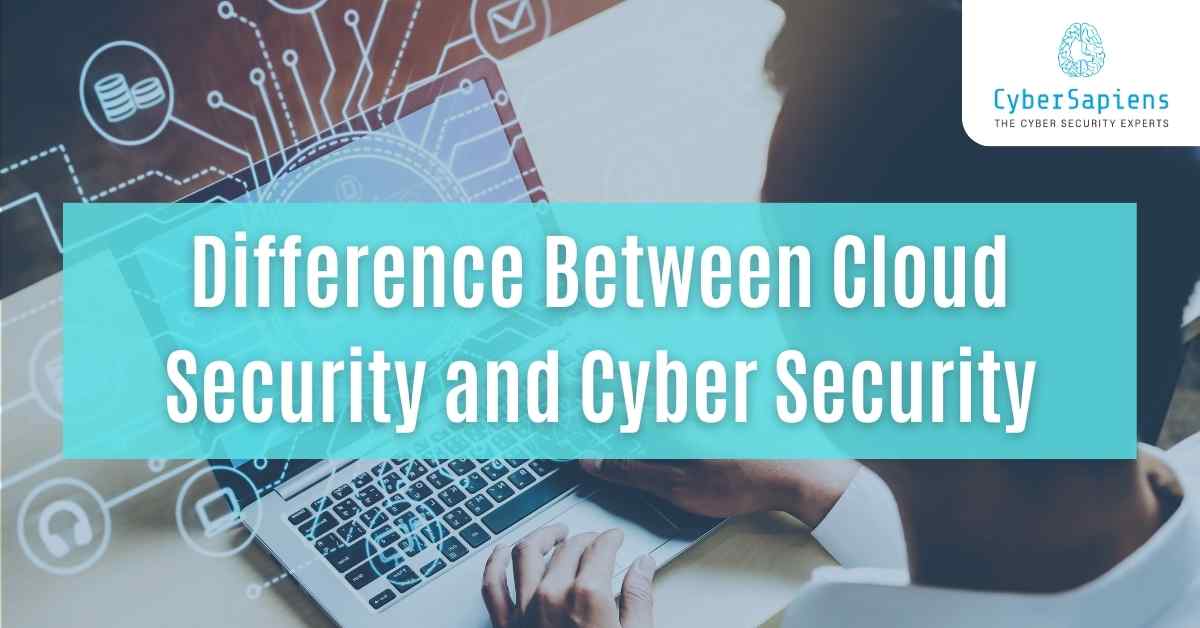The point of difference between cloud security and cyber security is a major topic that needs a discussion to clear out the doubts that most people have in this regard.
With the advancement of technology, cloud security vs cyber security is growing rapidly, thus bringing data susceptibility. Every business around the world needs to protect their data, which is very crucial for their success in the long run.
Apart from this, cloud security is the ultimate solution for organizations worldwide to secure data in a better way. Furthermore, this blog exists to clear all your doubts regarding cybersecurity in the cloud.
Meaning of Cyber Security and Cloud Security

Cybersecurity is the practice of safeguarding computer systems, networks, and data against theft, damage, or unauthorized access. In this cut-throat interconnected world, governments, businesses, and individuals heavily depend on cybersecurity measures to defend themselves against a variety of threats.
Cloud security protects data, applications, and infrastructure associated with cloud computing. It plays a vital role in addressing unique challenges and risks that come along with storing and processing data in the cloud.
With these, we get to know that both are quite different from each other. Hence, it is time now to unravel the difference between cloud security and cyber security from the write-up below.
Pointers that Differentiate Cyber Security from Cloud Security

The main difference between cloud security vs cyber security is that the first focuses on securing data in the cloud, and the latter safeguards data over the internet.
Below are some key terms defining the difference between cloud and cyber security. Let’s take a look below:
1. The Main Goal
Cyber security is mainly a broad term that protects information systems, networks, devices, and data against several other cyber threats based on location or infrastructure. All of these include on-premise systems, networks, devices, and data from various other cyber threats.
Cloud security secures cloud-based data, applications, and infrastructure, considering all the aspects of cloud computing environments.
2. Shared Working Model
In the traditional sense, cyber security gives organizations full control and responsibility to secure on-premises infrastructure and data.
On the other hand, cloud security works on a shared responsibility model where cloud service providers are responsible for securing the infrastructure, and businesses are responsible for securing their data and applications within the cloud.
3. Control Access Feature
Cybersecurity provides access controls to internal networks and systems through firewalls, authentication, and authorization mechanisms.
Meanwhile, cloud security deals with cloud-based resources that call for robust identity and access management solutions defining and enforcing permissions for users and applications.
4. The Dynamic Nature
Another point of difference between cloud security and cyber security is the latter one centers around relatively static and predictable on-premises infrastructure. Here, the changes that occur take place on a frequent basis.
In terms of cloud security, it quickly adapts to the dynamic nature of cloud environments. Here are resources that are provisioned, scaled, and decommissioned rapidly, needing security measures to be elastic and scalable.
5. Location and Mobility
In cyber security, the data limits itself within the physical boundaries of a specific organization. The data mobility is limited here when compared to cloud environments.
All the challenges that threaten the movement and storage of data spread geographically across cloud servers fall under cloud security. These involve data residency, sovereignty, and compliance across various regions.
6. Data Encryption
Cyber security is all about encrypting data at rest and in transit within an organization’s internal network.
For cloud security, the use of data encryption occurs not only within the provider’s infrastructure but also during the transfer of data to and from the cloud. Thus adding a layer of protection within suspicious environments.
7. Resource Scaling
Cyber security is all about fixed and predefined infrastructure. The scaling part is a more gradual and deliberate process.
Cloud security needs more rapid scalability of cloud resources, ensuring seamless security measures that expand or contract on a demand basis.
8. Automated Security
Cyber security is everything that involves automating security processes within the company’s on-premise environment.
Whereas, cloud security leverages cloud-native tools and services for automated security tasks. It takes complete benefit of the agility and programmability offered through cloud platforms.
9. Challenges in Incident Response
Cyber security faces obstacles while coordinating with incident response across multiple premises systems and networks.
Cloud security needs to streamline incident response procedures that account for cloud resources’ distributed and virtualized nature, often involving collaboration with the cloud service provider.
Cloud Security Vs Cyber Security: Which is Better?

Pointing out the difference between cloud and cyber security is more than determining which is better. Rather, they serve differently when it comes to overall organization security strategy.
1. A Complete Unified Approach
Rather than viewing them as separate terms, businesses must adopt them as a unified approach that implements both cloud security and cyber security. This ensures a perfect defence strategy against powerful malicious attacks.
2. Selecting the Right One for Each Domain
Cyber security tools are necessary to protect on-premises networks, endpoints, and internal systems. Some examples are intrusion detection systems, antivirus solutions, network monitoring tools, and many more.
To secure cloud-based resources, specific tools come in handy. This includes encryption services, cloud-based firewalls, and security information and event management systems catering to cloud environments.
Factors to Consider for Decision Making
Before heading onto a complete conclusion after gathering information about cloud security vs cyber security, check out the things that you can consider below:
- Consider the nature and extent of your organization’s infrastructure that heavily influences cybersecurity or cloud security.
- The industry and geographical locations must be taken into consideration to operate on compliance requirements.
- Conduct a thorough risk assessment to identify specific vulnerabilities and threats to your organization.
Conclusion
Finally, we have reached the end of this blog containing the difference between cloud security and cyber security. Instead of only one, businesses must go for an integrated and adaptive security posture that addresses potential threats in the full spectrum.
In this era of evolving cyber challenges, choosing the right cyber and cloud security service provider is the key to a successful business without any pressure from data breaches.












